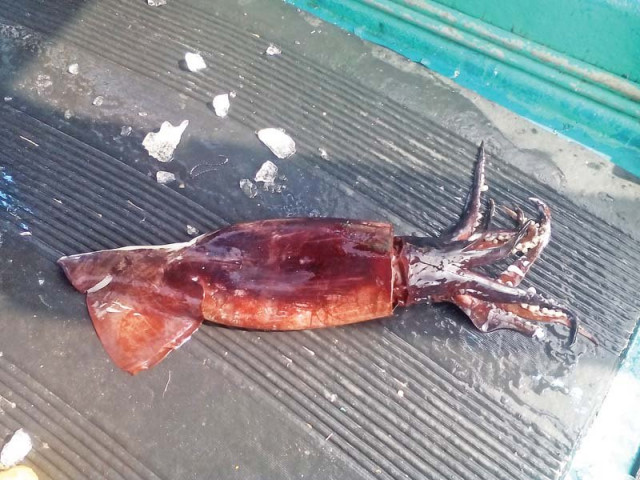Rise in squid population recorded along the coast
WWF-Pakistan trained fishermen have spotted increase in purple back flying squid

The presence of a large number of oceanic squid was reported along the coast of Karachi. PHOTO: COURTESY WWF PAKISTAN
Naturally, the squids remain near the ocean bed and sometimes during the night they swim to the surface. In the past few days, local fishermen have begun to observe an increase of purple back flying squid along the Sindh and Balochistan coasts.
A WWF-Pakistan trained fisherman, Nakhuda Hidayatullah, recorded a large number of squids encircling his gillnetter in the day 65 nautical miles southwest of Cape Monz.
According to Karachi University marine biologist Dr Pirzada Jamal, squids live in open waters from the surface down to depths of around 1,000 metres. They exhibit diurnal vertical migration and move from the depths of the ocean to the surface or shallower waters during the night.
He added that such changes on the coastal belts of Pakistan are possibly because of the overall climate change the world is experiencing. This phenomenon should be a wakeup call on how we are dealing with climate change, he said.
On the other hand, WWF-Pakistan technical advisor for marine fisheries, Moazzam Khan, said that purple back flying squid are among the sea creatures spotted often in our coastal areas. Khan also recalled that once Japanese research vessel R/V Shoyo Maru during a survey in 1975 located a dense concentration of this squid about 90 nautical miles off Pasni, Balochistan. They observed that purple back flying squid seemed to inhabit the oceanic depths of between 120 metres to 200 metres during the day. A positive light attraction effect due to the vessels' light was observed during night time. Acoustic survey revealed that the squids are widely and abundantly distributed in the offshore waters in the region. However, in 1976 this research vessel again conducted acoustic surveys but could not locate any such concentrations.
Khan said it is interesting to note that in some other areas of the Arabian Sea and Persian Gulf, unprecedented occurrence of purple back flying squid was observed during November and December of 2016. Fishermen in Fujairah, UAE, caught a large number of this oceanic squid in November, 2016. Similarly, very high catches of this species were recorded in Oman. From both these areas, the squids were processed and exported. However, the processing industry in Pakistan has not yet taken any such steps for harvesting, processing and exporting the squid. He mentioned that squids have a great market in far eastern countries such as South Korea and Japan.
Meanwhile, responding to a question about the changes in coastal areas of Pakistan, Khan said that this is because of climate change and a few more changes were witnessed such as an increased concentration of Indian mackerel, Indian oil sardine and Japanese thread fin, which are not often seen in Pakistan's coastal areas.
Published in The Express Tribune, January 16th, 2017.



















COMMENTS
Comments are moderated and generally will be posted if they are on-topic and not abusive.
For more information, please see our Comments FAQ